It doesn’t begin with a bang. Hearing loss is not a sudden slam of a door, plunging you from sound into silence. It’s more like a slow, creeping fog that rolls in so quietly you might not notice it at all. It’s a gradual turning down of the world's volume, a slow fade you might blame on everything but your own ears.
Then one day, you catch yourself wondering: has everyone started mumbling? Or maybe you feel the world itself has gotten quieter, losing its sharp edges, like a photograph slowly going out of focus.
This is the silent beginning. But what comes next?
It Starts with a Whisper: The First Sounds You Lose
Think back. When was the last time you truly felt the crisp, delicate crackle of autumn leaves under your feet? Or heard the high, joyful squeal of a child’s laughter from across the park? For most, these are the first notes to go. They don't vanish entirely, but they lose their definition, becoming flat, distant echoes of what they once were.
Soon, that feeling bleeds into everything. A lively café, once a vibrant tapestry of clinking cups, distinct conversations, and humming espresso machines, dissolves into a blurry, indecipherable wall of noise. You find yourself leaning forward, straining not just to hear, but to understand. This isn’t deafness. This is a gradual retreat from the rich, textured world you once knew. And this is where the isolation begins to take root.
This slow fade is a journey shared by millions. The infographic below reveals the staggering scale of hearing loss, a silent epidemic that shows just how many are walking this same quiet path.
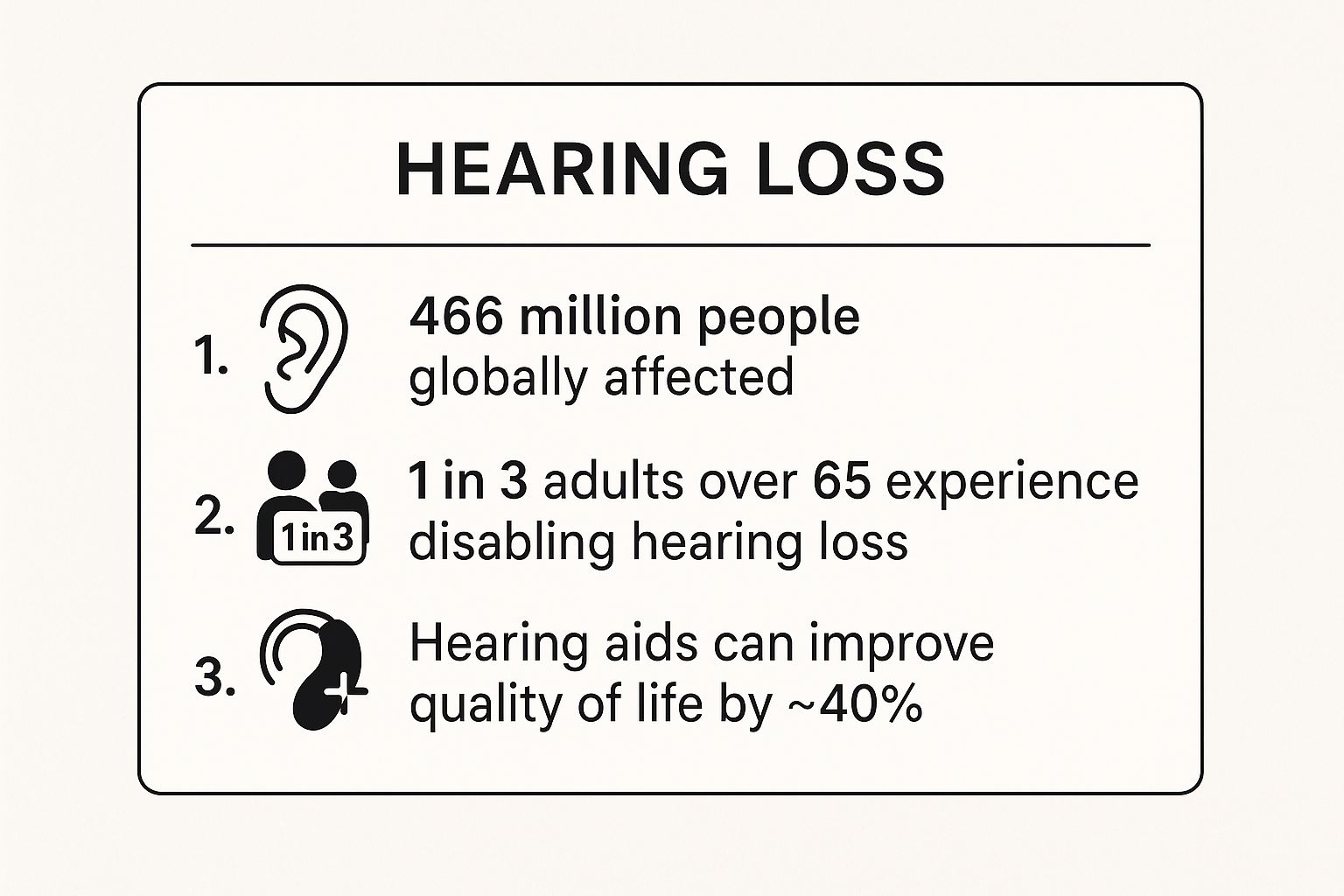
As you can see, you are far from alone. This slow fade is a global phenomenon. But recognizing it is the first step toward turning the volume of your life back up.
Then Comes the Exhaustion: The Hidden Price of Listening
While the physical change is slow, the emotional toll can hit like a tidal wave. It’s that quiet sting of frustration when you miss the punchline of a joke for the third time in a row. It’s that bone-deep weariness you feel after a family dinner—an exhaustion born not from socializing, but from the mental acrobatics of trying to piece together fractured conversations.
You might start blaming the acoustics of the room. You might tell yourself everyone is talking too fast. These are natural defenses, your mind’s attempt to push away the creeping suspicion that the problem lies closer to home.
If this story feels intimately familiar, it's because it is. Hearing loss is one of the most common health conditions on the planet. One in seven Americans lives with it. Globally, an astonishing 1.5 billion people experience some degree of hearing loss. These aren’t just numbers on a page; they are a powerful validation that needing help to hear is a normal part of the human experience.
To help you connect the dots, we’ve translated these feelings into the most common early warning signs.
The Secret Language of Hearing Loss
| What You Feel (Your Experience) | What Is Actually Happening (The Reality) |
|---|---|
| "What?" becomes your most used word, especially in groups. | Your brain is fighting to build a coherent picture from incomplete sound data. |
| You feel like everyone is mumbling or swallowing their words. | You're losing high-frequency sounds—the crisp consonants ('s', 'f', 'th') that give words their clarity. |
| The TV volume is always a point of contention with family. | You need more volume to achieve the same level of clarity you once had effortlessly. |
| You can't follow conversations in a noisy restaurant. | Your brain's natural ability to filter speech from background noise is weakening. |
| You feel mentally drained after social events. | The sheer cognitive effort of decoding garbled sound is sapping your mental energy. |
| Phone calls are becoming a nightmare. | Without visual cues like lip-reading, your brain can't fill in the auditory gaps. |
Seeing your own life reflected in this table isn't a moment of defeat. It's a moment of clarity. It’s the first step toward putting a name to the invisible struggle.
You are not losing your mind. You are losing specific frequencies. The world hasn't gone quiet—it's just waiting for you to tune back into its symphony.
If this is your story, it’s time to understand the 'why'. The next chapter begins by learning more about the mechanics of this change, and you can start by understanding the causes of hearing loss and how to mitigate them.
You Hear the Music, But Miss the Lyrics: The Clarity Problem

Does this feel chillingly familiar? You’re in a conversation. You can hear the sound—the rhythm, the melody, the undeniable presence of their voice. But the actual words? They collapse into a muffled, frustrating blur just before they reach you.
You lean in, ask them to repeat it, certain they swallowed half the sentence. But they look back, confused, and say they were speaking perfectly clearly. This maddening cycle is not just an annoyance; it is one of the most precise and revealing signs you need hearing aids.
You are not imagining things. And they are not mumbling. What you are experiencing is the classic calling card of high-frequency hearing loss.
Your Sound Picture Is Losing Its Sharpness
Imagine your hearing is a high-definition photograph, rich with pin-sharp detail and vibrant color. High-frequency hearing loss is like a cruel, invisible hand slowly turning the focus dial. The big shapes remain—you can still see the general outline of the image—but all the fine textures and crisp edges have dissolved into a hazy, undefined mess.
This is precisely what is happening to the words you hear. The low-frequency sounds—the deep, resonant hum of vowels like 'A', 'O', and 'U'—are coming through loud and clear. They provide the power and volume of speech, which is why you know someone is talking.
The treachery lies with the high frequencies. These are the soft, airy, delicate consonants that are the first to fade.
- The Architects of Language: Sounds like ‘S’, ‘F’, ‘Th’, ‘Sh’, and ‘T’ are what give words their shape and definition.
- The Critical Difference: They are what separate "fight" from "light," or "pass" from "path."
When your ears no longer deliver these crucial sounds, sentences begin to fall apart. The words dissolve into a string of vowel-heavy murmurs, leaving your brain to solve an impossible puzzle with half the pieces missing.
Your Brain Is Working Overtime to Solve the Puzzle
This constant, subconscious guesswork is mentally draining. You find yourself watching lips like a hawk, desperately scanning for context clues, all just to stay afloat in the river of conversation. It’s no wonder social gatherings start to feel less like a joy and more like a grueling exam you can never quite pass.
Hearing should not be a detective story. If you hear the rumble of a car but can't distinguish the tune on the radio, it's a giant red flag that your ears are no longer delivering the high-frequency detail needed for clarity.
This isn't just a minor inconvenience; it's a fundamental breakdown in the way we connect. Restoring those lost frequencies is precisely what a modern hearing aid is engineered to do. It’s like a master photo editor, meticulously sharpening those blurry edges and bringing the entire soundscape back into brilliant, effortless focus.
So you can finally stop guessing and start knowing again.
You Feel a Social Hangover: The Fatigue You Can't Explain
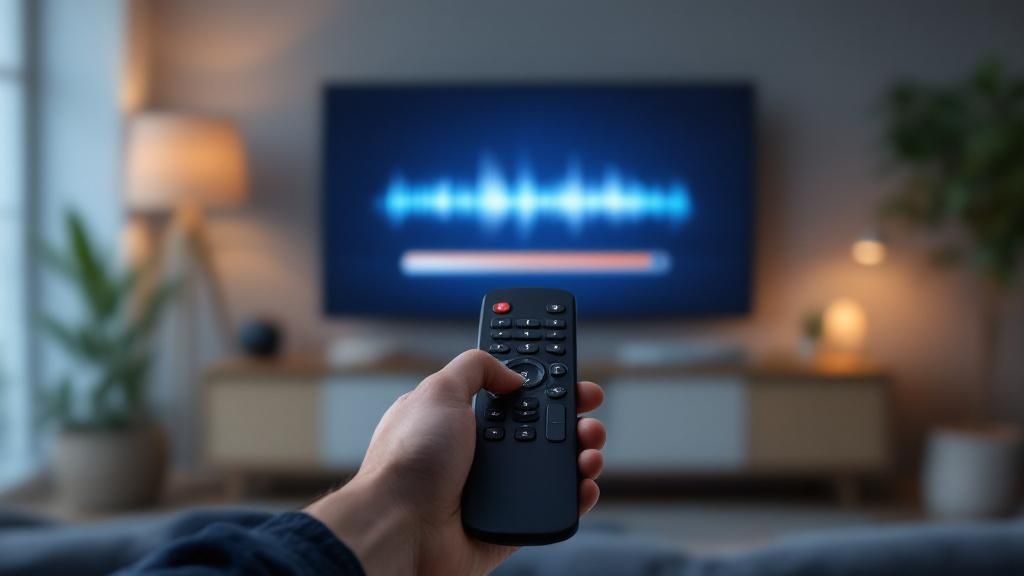
It’s the most puzzling symptom of all. You leave a bustling restaurant or a lively family party feeling utterly depleted. Not just tired, but drained—as if you’ve run a mental marathon.
This profound exhaustion, this "social hangover," is not a sign of introversion. It's a powerful, often-ignored signal that your brain is being pushed to its absolute limit just to hear.
This phenomenon is called listening fatigue. It’s the deep mental burnout that occurs when your brain is forced to work overtime to process incomplete sound signals. With hearing loss, your brain doesn’t just receive fuzzy audio; it furiously scrambles to fill in the missing information, constantly guessing, predicting, and decoding every syllable.
Imagine your brain is a smartphone. Healthy hearing is like running a single app, using minimal battery. But with hearing loss, your brain is forced to run dozens of power-hungry programs in the background simultaneously, just to perform that same basic function. Is it any wonder the battery dies so quickly?
The True Cost of This Invisible Effort
This intense mental exertion is what scientists call cognitive load. Your brain is allocating a massive amount of its resources simply to decipher fragmented sounds. This leaves less power for everything else—memory, focus, emotional regulation. It’s why you might feel surprisingly irritable after a long meeting or anxious in a crowd.
This invisible battle has very real consequences:
- The Social Retreat: You start declining invitations, not because you don't want to go, but because you instinctively know the mental price you will pay.
- The Conversation Dropout: You find your mind wandering during long talks. It’s not boredom; it’s your brain’s processing power hitting a red line, forcing a shutdown.
- The Professional Burnout: Complex discussions at work become a source of dread, leaving you feeling less capable and eroding your professional confidence.
This isn't a failure of willpower. Your brain is simply being asked to perform an impossible task without the proper tools.
The exhaustion you feel isn't just "being tired." It is a biological distress signal. It's your brain screaming that it's being starved of clear information and needs help.
This is precisely where technology becomes your ally. Modern hearing aids from HearDirectClub don’t just amplify sound; they restore clarity. They deliver a cleaner, more complete sound signal before it even reaches your brain.
By dramatically reducing that cognitive load, the guesswork stops. The extra mental programs shut down. And all that energy is finally liberated, allowing you to stop trying to hear and simply start enjoying the connection again.
The Crowd Becomes a Roar: When Background Noise Turns Against You
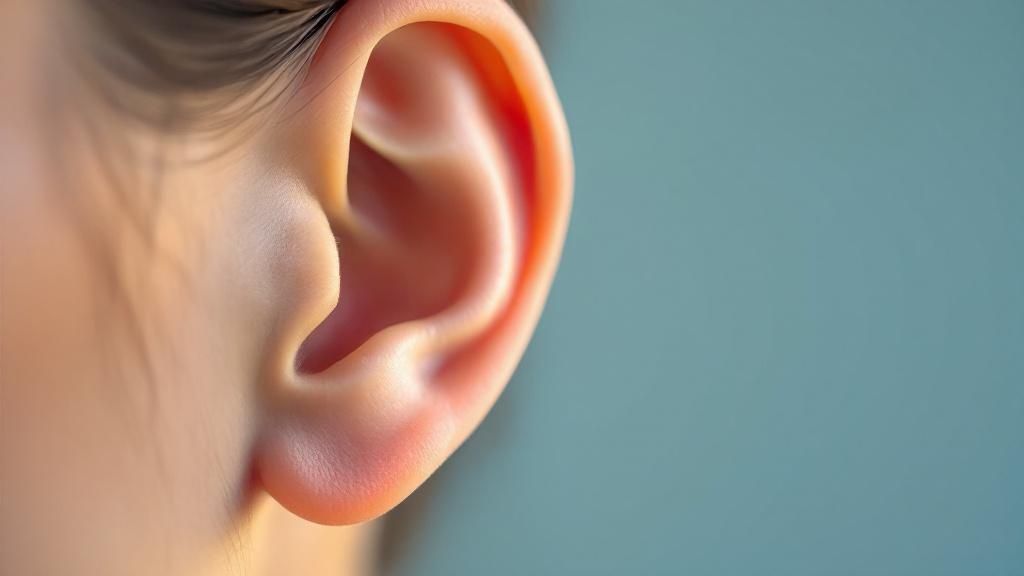
For so many, this is the breaking point. A quiet chat at home? You can manage. But the moment you step into a vibrant restaurant, a laughing crowd, or even a busy supermarket, the world collapses into chaos.
Suddenly, the voice of the person right in front of you is ripped away, swallowed whole by an overwhelming wall of sound. The clatter of cutlery, the hum of distant conversations, the hiss of the air conditioner—it all melds into an aggressive, indecipherable roar. This is the moment background noise becomes your personal enemy, and it is one of the most definitive signs you need hearing aids.
This isn't just about volume; it’s about your brain’s ability to filter. Healthy ears act like a sophisticated sound mixer, effortlessly isolating the voice you want to hear and pushing everything else into the background. It’s a miraculous biological gift we take for granted—until it begins to fail.
The Breakdown of Your Brain's Natural Filter
With hearing loss, this delicate filtering mechanism is one of the first casualties. Your brain no longer receives the clean, crisp signal it needs to distinguish speech from noise. It’s like trying to tune into a single radio station while four others bleed through at full volume.
You find yourself smiling and nodding, pretending to follow along, while inside you’re catching only scattered words. The human connection you craved dissolves into a stressful performance. Soon, you begin to avoid these places altogether, choosing the safety of silence over the frustration of the crowd.
This retreat is a powerful force, and it’s fueling a global shift in awareness. Hearing aid sales rocketed by over 5 million units between 2017 and 2022 alone. This isn't just about technology; it's about a culture deciding that connection is no longer optional. Dive deeper into these trends in hearing health on ConsumerAffairs.com.
Reclaiming Your Seat at the Table
The brilliant news is that technology has been engineered to solve this exact problem. Modern hearing aids are your personal sound filter, designed to help you thrive in the very environments you’ve started to fear. They don't just make things louder; they make them smarter.
This is not about amplification. This is about restoration. It’s about giving your brain the clean signal it needs to do what it does best: focus on the human voice.
Our hearing aids use two key technologies to conquer the roar:
- Directional Microphones: These intelligent systems automatically focus on sound from in front of you (the person you're talking to) while actively suppressing noise from the sides and back.
- Intelligent Noise Reduction: Advanced algorithms analyze your environment in real-time, identifying and softening steady background noise like a fan's hum or a crowd's din, allowing speech to cut through with stunning clarity.
With these tools, you can step back into that noisy world with confidence. Instead of a wall of sound, you can once again find that single voice, lock onto it, and be part of the moment.
There's a Ringing Only You Can Hear: The Ghost in Your Ears
It's a sound that exists only in your world. A high-pitched whine that never rests. A low, persistent hum. A relentless hiss, like a TV tuned to a dead channel. It’s your own private, unwelcome soundtrack.
This phantom noise is called tinnitus. And while it can feel like a separate, maddening curse, it is often one of the most compelling and direct signs you need hearing aids. For the overwhelming majority of people, that ringing is not a disease. It's an auditory ghost, a sound created by your brain to compensate for what it can no longer hear from the outside world.
Your Brain Is Creating Sound to Fill the Silence
To understand tinnitus, think of phantom limb syndrome. When a person loses an arm, their brain, starved of signals from that limb, can create the vivid sensation that it’s still there.
Tinnitus operates on the same principle. As hearing loss begins, your brain is deprived of the external sound frequencies it's accustomed to processing. In response to this new silence, the auditory cortex can become overactive, essentially "inventing" its own sound to fill the void.
That ringing is not an attack; it's a distress signal. It’s your brain’s way of telling you it's missing vital information. In fact, research shows that over 90% of people with tinnitus also have some degree of measurable hearing loss.
Tinnitus is your brain's alarm bell, ringing to alert you that it is no longer receiving the full symphony of sound it expects. The sound you hear is a direct product of the sounds you are missing.
Turn Down the Ringing by Turning Up the World
This is where hearing aids can be life-changing. By reintroducing the very sounds your brain has been missing, they give your auditory system something real and external to focus on.
As the rich details of conversation, music, and nature are restored, your brain has meaningful audio to process once again. It no longer needs to generate its own noise to fill the silence. For many users, this causes the tinnitus to fade dramatically into the background, often to the point where it ceases to be a nuisance. The ghost doesn't vanish—it's just that your brain finally has something far more interesting to listen to.
You've Recognized the Signs. What Happens Now?
This moment—right now—is the turning point. It's the moment you stop blaming the world for being too quiet and decide to reclaim the sound you've been missing. But what is the next step? For many, the path forward feels shrouded in myths of clunky devices, endless appointments, and prohibitive costs.
Let's clear the fog. That world is gone.
Taking your first step back into a world of vibrant sound has never been more direct or empowering. The old barriers have been dismantled. High costs, social stigma, and needless complexity have been replaced by a system that puts you in control of your own hearing health. This is not about navigating a confusing medical maze; it's about making a clear, confident choice for yourself.
Your Simple Path from Silence to Sound
We designed this journey to be radically simple, moving you from awareness to action without the traditional friction. It is a stigma-free path that puts incredible technology directly into your hands.
And it’s clear this modern approach is what people have been waiting for. Valued at $13.97 billion in 2024, the hearing aid market is projected to more than double to $29.58 billion by 2032. This explosive growth is driven by people just like you, finally opting for discreet, powerful, and accessible solutions. You can explore the data behind the growing hearing aid market on fortunebusinessinsights.com.
So, what does this new path look like? It’s refreshingly simple.
- Acknowledge Your Story: You’ve already taken the most difficult step by reading this far. Recognizing that the frustration, the fatigue, and the missed words are real is a profound act of self-awareness.
- Discover What's Possible: Forget the hearing aids of the past. Today’s technology is virtually invisible, astonishingly intelligent, and accessible. Our guide on how to choose hearing aids will reveal a world of options you never knew existed.
- Experience the Change, Risk-Free: With HearDirectClub, the decision is yours to make, without pressure. We deliver directly to you with a 100-day, full-refund trial. You get to hear the difference in your own life, on your own terms.
Dismantling the Old Fears
Let's confront the old anxieties that may still be holding you back. It’s normal to have them. But they belong to a bygone era.
You are not just buying a device; you are investing in getting your life back. You're choosing clear conversations, renewed energy, and the joy of effortless connection.
Modern hearing solutions have rendered those old fears obsolete.
- The Cost: By eliminating the middlemen, we deliver premium, state-of-the-art technology at a fraction of the traditional price.
- The Look: Our devices are masterpieces of discretion. Sleek, comfortable, and so tiny that no one will ever know you’re wearing them unless you choose to tell them.
- The Complexity: Forget endless tuning appointments. Our hearing aids arrive pre-programmed for the most common forms of hearing loss, ready to use right out of the box.
This is your moment. The time to turn nagging awareness into decisive action. You deserve a life filled with rich, vibrant, and crystal-clear sound.
Frequently Asked Questions About Hearing Aids
Even after recognizing the signs, questions naturally surface. Taking this step is a significant decision, and it’s smart to be curious. Let's address the most common concerns that people have when they stand at this same crossroads.
Will People Stare at Me?
This is the number one fear, and it’s rooted in a mental image that is decades out of date. The clunky, beige devices of the past are relics. Today’s hearing aids are marvels of engineering and discretion, designed to be nearly invisible, tucked away behind your ear or nestled deep within the ear canal.
Let’s be direct: your hearing loss is far more noticeable than a modern hearing aid will ever be. Constantly asking "what?" or unintentionally appearing aloof when someone speaks to you draws far more attention than a tiny, sophisticated piece of technology.
Modern hearing aids are designed to blend in so you can stand out for the right reasons—your wit, your presence, and your engagement in the conversation.
Is Getting Used to Them Hard?
Think of it like getting a new pair of prescription glasses. Your brain needs a moment to recalibrate. For years, it has been overworking, straining to make sense of a muffled world. When you suddenly reintroduce the full spectrum of sound, the world can seem intensely vivid at first. This isn't a problem; it's proof that the devices are working perfectly.
Most people find their brain fully adapts within a few days to a couple of weeks. The key is consistent use. The more you wear them, the faster your brain relearns how to process and filter the rich world of sound. Soon, that newfound clarity won't feel new at all—it will just feel normal. To ensure they perform at their best, you'll want to keep them pristine with our simple guide on how to clean hearing aids.
Can Hearing Aids Stop My Hearing Loss from Worsening?
While hearing aids cannot reverse existing damage or halt the natural aging process, they play a vital role in protecting your brain's health. When hearing loss is left untreated, the auditory pathways in your brain become understimulated. They can weaken and even atrophy from disuse, a process known as auditory deprivation.
By delivering a clear, consistent stream of sound, hearing aids act like a workout for your brain, keeping those crucial neural connections strong and active. You aren't just hearing better today; you are actively investing in your long-term cognitive vitality for tomorrow.
Ready to stop missing out and start hearing what matters most? HearDirectClub makes it simple and risk-free. Find out what you've been missing in the comfort of your own home with our 100-day risk-free trial. Discover your solution at HearDirectClub.com.


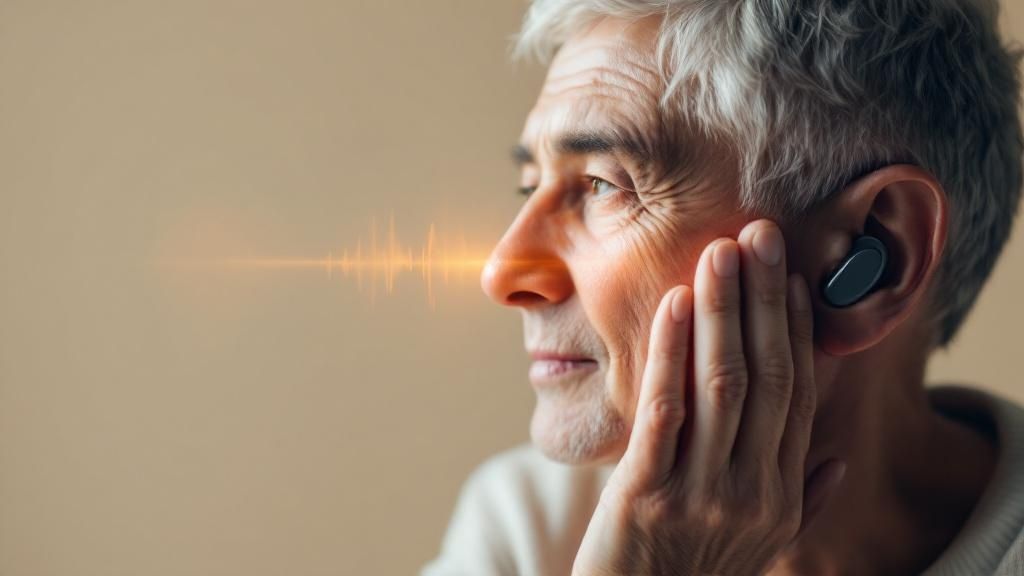
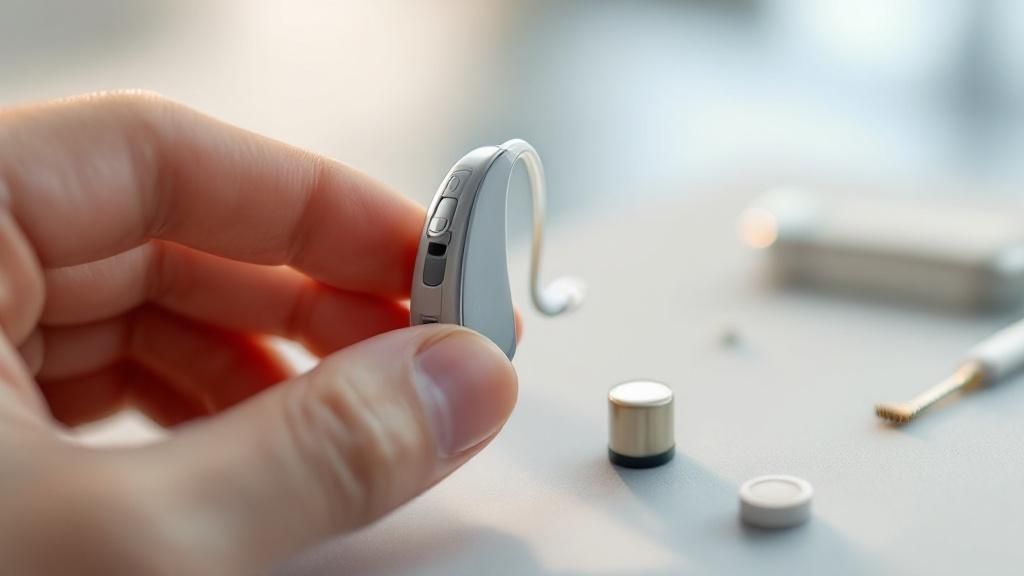

Leave a comment
This site is protected by hCaptcha and the hCaptcha Privacy Policy and Terms of Service apply.